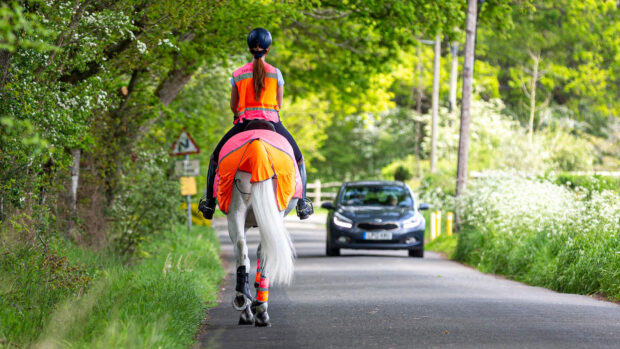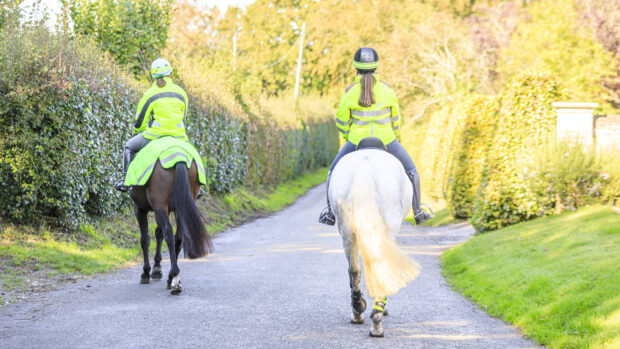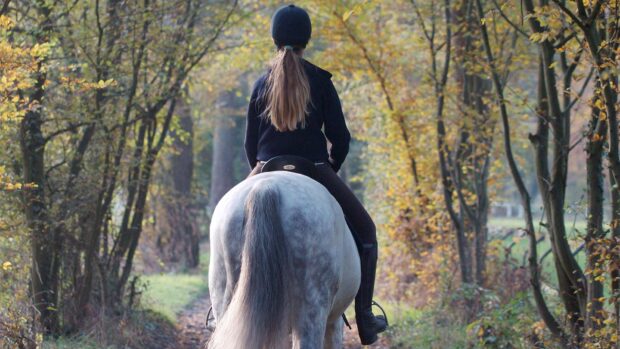Working out what insurance you do and don’t need when you’re out and about on the road with your horse can be confusing. Horse & Hound sets the record straight.
Cars need to be insured to be on road, but do you need insurance to ride your horse on the road? The short answer is no, there is no legal requirement for horse or rider to carry insurance in order to use roads. But that doesn’t mean it isn’t a good idea.
Public liability cover
The British Horse Society (BHS) “strongly advises riders to take out public liability insurance, although it is not a legal requirement, as if a horse in their care causes damage to property or injury, they may be liable to pay considerable costs”.
“When riding on roads, horse riders should consider both public liability insurance as well as personal accident cover with insurance providers offering cover for both junior riders (up to 17) and adult riders (ages 18-75),” says Francis Martin, CEO of The Insurance Emporium. “It’s worth noting that both types of cover are typically included within horse rider insurance.”
A spokesperson at SEIB, a specialist equine insurance broker, says: “Public liability covers claims brought against you by a third party following property damage or bodily injury for which you are legally liable.”
SEIB’s literature explains how public liability insurance relates to horses: “For example if your horse escapes from its field in the night and runs out in front of a moving car resulting in damage to the car and injury to the driver, you could be made to pay the compensation costs for this incident even though you were tucked up in bed at the time.”
It’s not a road specific insurance, but it covers anything that happens while on a road, or any other public place.
What if you don’t own the horse? Are you still covered for public liability? A PetPlan spokesperson explained: “Firstly, you need to check whether the horse is insured and if it is, ask the owner to confirm what cover is in place. If the owner has cover for third party liability check if it covers just the owner, named riders or anyone riding and handling the horse with the owner’s permission.”
Personal accident cover
As the person most likely to be injured in a riding accident is the rider, it’s also recommended that they take out personal accident cover.
SEIB’s spokesperson adds: “Personal accident cover provides benefits in the event of injury following an accident. Cover can be provided for death, loss of limb or sight, permanent total disablement or weekly benefits, however this is not an exhaustive list of benefits available.”
Some personal accident policies include an optional upgrade to include fracture cover, which will pay out if you suffer broken bones as the result of a horse-related incident.
It is important to note that personal accident policies do not typically cover the associated costs if an injured rider needs to take time off work, or employ someone to assist them with their horse following an injury. You will need income protection cover in this case.
Many insurance companies also offer an upgrade for vet’s fees, should the horse be injured in an accident.
Even if you don’t own the horse, you can still take out rider insurance. A number of insurance companies offer a rider-only insurance package.
The BHS Gold membership starts at £8.50 per month, if paying by direct debit, and £102 for a one-off payment and includes public liability insurance, personal accident, and, according to a BHS spokesperson: “Covers you for any horse you own, look after, or ride.”
Shearwater also offers personal accident cover for riders, which, a spokesperson explained: “Will cover you as a rider if you get injured, offering a multitude of benefits, however it does not cover any potential damage to someone else’s property, for example a car.”
This list isn’t comprehensive. Anyone interested in personal injury insurance or public liability cover should go online and see what’s out there. Shop around to find the policy that’s right for you – and make sure you’ve read the small print. Being covered will help give you peace of mind if you’re riding on the roads.
- To stay up to date with all the breaking news from major shows throughout 2025, subscribe to the Horse & Hound website
You may also be interested in:

Are horse riders allowed to be two abreast on the road? H&H explains…
Riding two abreast on the road certainly has its pros and cons, but is it legal?

Why are horses measured in hands? H&H explains
One of the curious aspects of the horse world is that horses are measured in hands, an archaic unit that

Subscribe to Horse & Hound magazine today – and enjoy unlimited website access all year round




